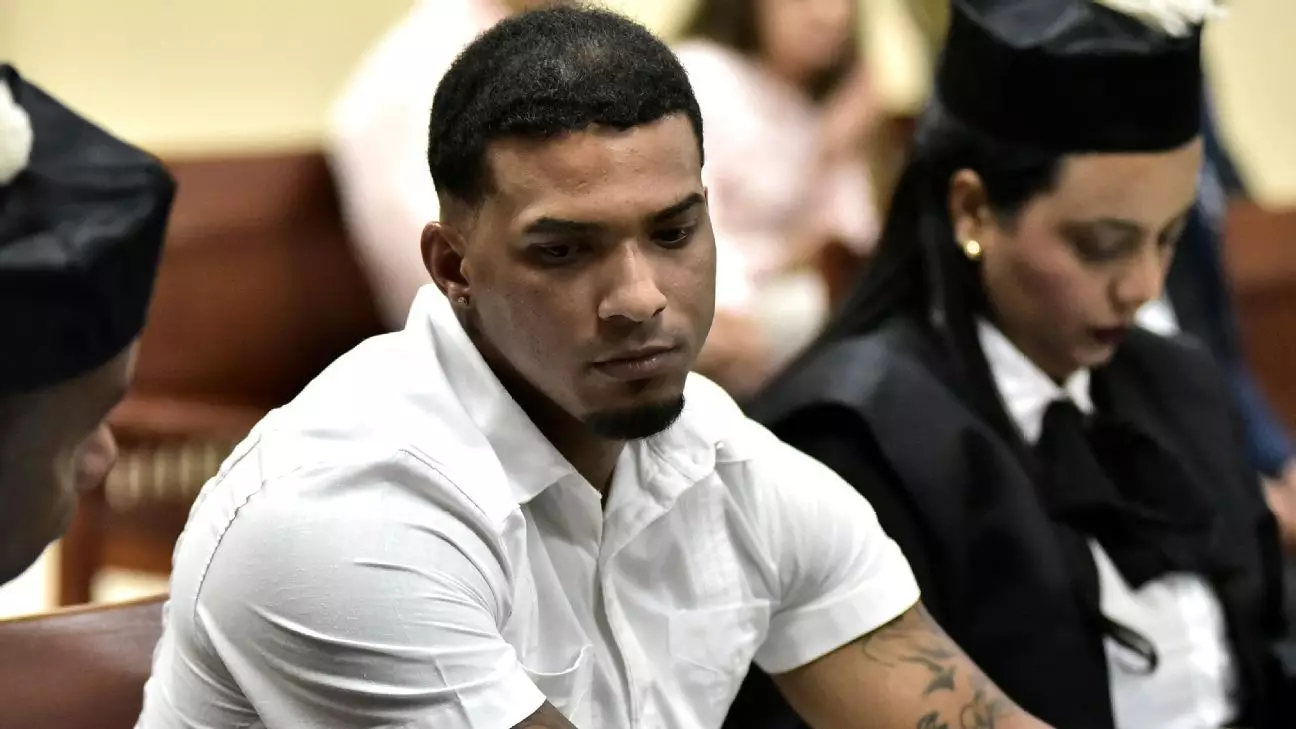Wander Franco, once celebrated as a rising star in Major League Baseball (MLB) and a cornerstone for the Tampa Bay Rays, has seen his career take a catastrophic turn due to serious criminal charges. This fall from grace underscores the precarious balance between talent and accountability, reflecting broader societal issues regarding the treatment of sexual abuse victims and the complicity of those who facilitate such abuse. In a particularly shocking case, Franco, now a convicted sex offender, was found guilty in the Dominican Republic for maintaining a sexual relationship with a 14-year-old girl when he was 21, resulting in a suspended two-year prison sentence. While he was fortunate to avoid immediate prison time, the ramifications of his actions will be long-lasting and may effectively end his career in professional sports.
The Legal Ramifications
Wander Franco’s conviction is not merely a legal label but a defining mark on his life’s narrative. The judge, Jakayra Veras, presiding over the case, decided against a five-year prison term, providing Franco with a suspended sentence under strict conditions—most notably, a prohibition against contact with minors. This leniency raises significant concerns about the broader judicial approach to cases involving power dynamics and sexual abuse, especially where the victim is a minor. Franco’s victim was protected from further harm only by a legal framework that, while possibly rehabilitative in intent, risks appearing overly permissive towards offenders in high-profile situations.
The conviction of the victim’s mother, Martha Vanessa Chevalier Almonte, also adds layers of complexity to the case. Sentenced to ten years for trafficking her daughter, her actions parallel Franco’s, highlighting a disturbing intersection of exploitation and abuse within familial structures, exacerbating the gravity of Franco’s misconduct. Such instances lead us to ponder the systemic failures that allow these heinous relationships to exist unchecked.
Impact on Franco’s Career
As the story unravels, it’s clear that Franco’s professional life is irrevocably altered. Previously deemed one of baseball’s brightest prospects after signing with the Rays for an astounding $3.8 million at the age of 16, he was blossoming into a significant athlete with an All-Star selection in 2023. Now, he finds himself facing a grim reality where not only is he banned from participating in the sport, but his financial future hinges on matters beyond his control. Being placed on MLB restricted list means that his hefty contract remains unpayable by the Rays, effectively nullifying financial security he might have banked on.
Navigating the complexities of work visas post-conviction could also create an insurmountable hurdle for Franco. Unless he can secure a path to legal employment in the United States amidst these controversies, his baseball career may be entangled in a series of legal battles that overshadow any previous achievements or accolades.
The League’s Response and Broader Implications
Major League Baseball, through its statement regarding Franco’s situation, emphasizes a commitment to combating domestic violence, sexual assault, and child abuse within its ranks. Critics, however, may argue that the league’s actions—placing Franco on paid administrative leave instead of immediate suspension—initially suggested a permissiveness that could embolden other players to disregard the seriousness of such allegations. The situation reflects a dichotomy within professional sports, where talent often overshadows moral accountability, although organizations claim their dedication to fostering a safe environment for all.
The ongoing investigation by MLB into Franco’s actions could lead to further sanctions or disciplinary measures under its domestic violence and assault policies. As public scrutiny intensifies, the league finds itself at a critical juncture where its response may set precedents for how similar cases are treated in the future.
Final Thoughts on Accountability
Franco’s story is not merely a cautionary tale of individual failures; rather, it reflects a societal struggle with accountability, power, and abuse. The tragic intersection of talent and morality disrupts not just the lives of the individuals involved, but also affects the fabric of our cultural narratives surrounding sports. The complexities of this case should prompt deeper discussions about the responsibility of athletes, the institutions that support them, and the safeguards necessary to protect vulnerable individuals from similar fates. Ultimately, the consequences of Franco’s actions go beyond his own ambitions, illuminating systemic issues that demand urgent attention.


Leave a Reply